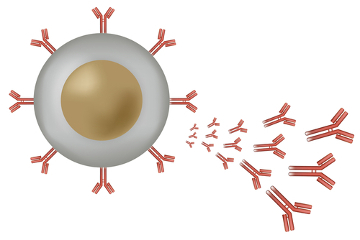Our bodies are in constant contact with possible disease-causing agents. Therefore, it is essential that our bodies have weapons against these agents. One of these weapons is the so-called antibody.
You antibodies are proteins that act defending our body against microorganisms and foreign substances, which are called antigens. These proteins bind to a particular antigen and cause its destruction or otherwise cause it to cease its activity.
Antibodies are produced by the mature B lymphocytes (also called plasma cells), which are a type of white blood cell present in our blood. Each antigen triggers the production of a particular antibody, with each antibody acting only on a particular antigen.

Mature B lymphocytes are responsible for producing antibodies
Because of the specificity of the antigen-antibody reaction, they are often compared to a key and a lock. Each key is capable of opening only one lock, as is an antibody that is only effective against one antigen. This means that an antibody that works to defend us against a bacterium will not be useful to defend us against a virus.
An extremely interesting feature about our body is its memory capacity. If we are contaminated by an antigen that has caused us a problem in the past, our bodies will quickly start producing antibodies. This is because, after an infection, they remain in our body. memory cells. They have the ability to recognize an infectious agent that we have had contact with.
This mechanism is essential for the efficiency of vaccines, substances made from antigens that are treated so as not to cause disease. When vaccinating a person, the body starts producing antibodies and memory cells. Therefore, when this micro-organism comes into contact with our body, it will quickly be destroyed, since antibodies will be produced more quickly.
Related video lesson:

